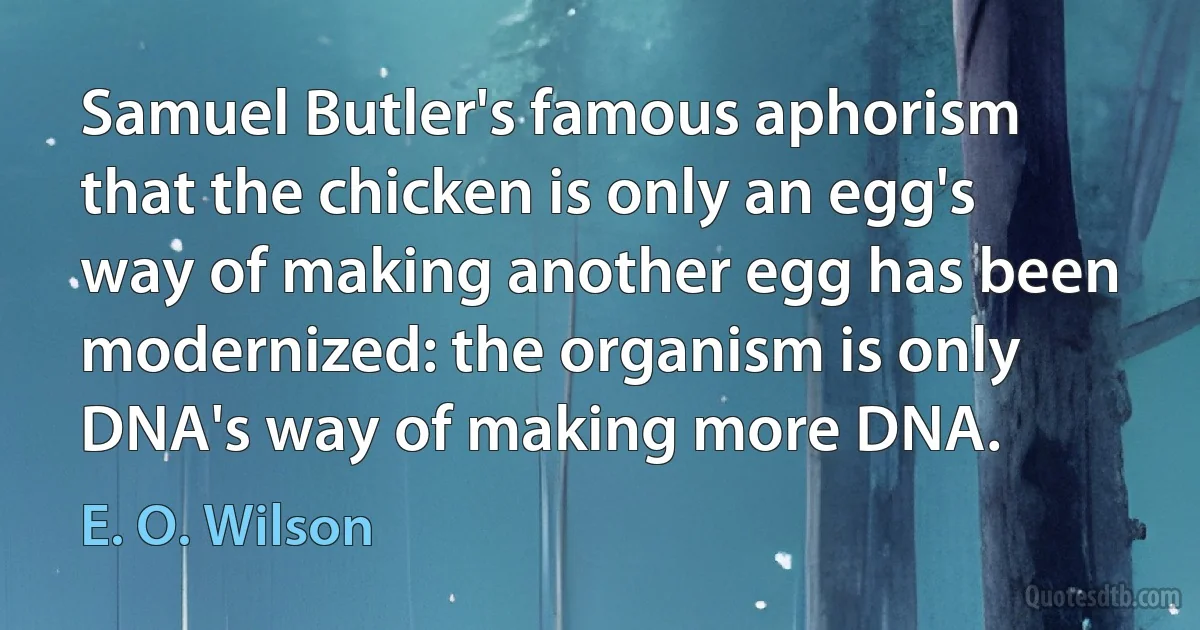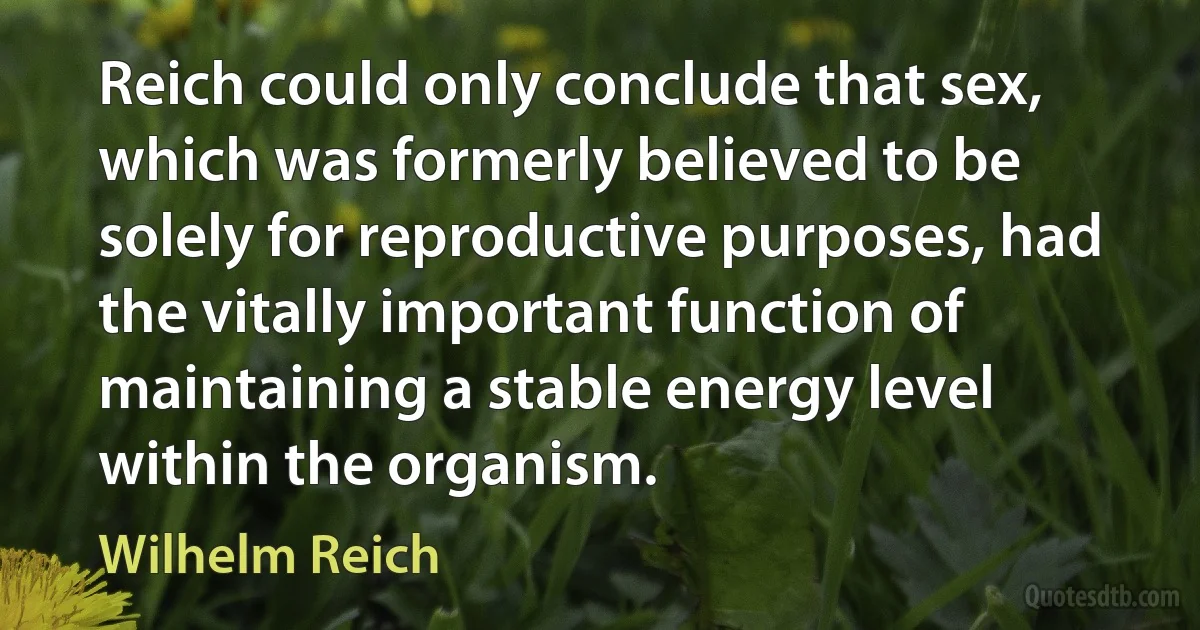Organism Quotes - page 13
The economic dictatorship of the monopolies and the political dictatorship of the totalitarian state are the outgrowth of the same political objectives, and the directors of both have the presumption to try to reduce all the countless expressions of social life to the mechanical tempo of the machine and to tune everything organic to the lifeless machine of the political apparatus. Our modern social system has split the social organism in every country into hostile classes internally, and externally it has broken the common cultural circle up into hostile nations; and both classes and nations confront one another with open antagonism and by their ceaseless warfare keep the communal social life in continual convulsions.

Rudolf Rocker
We come from a dark abyss, we end in a dark abyss, and we call the luminous interval life. As soon as we are born the return begins, at once the setting forth and the coming back; we die in every moment. Because of this many have cried out: The goal of life is death! But as soon as we are born we begin the struggle to create, to compose, to turn matter into life; we are born in every moment. Because of this many have cried out: The goal of ephemeral life is immortality! In the temporary living organism these two streams collide ... both opposing forces are holy. It is our duty, therefore, to grasp that vision which can embrace and harmonize these two enormous, timeless, and indestructible forces, and with this vision to modulate our thinking and our action.

Nikos Kazantzakis
...If we had the time we should now go on to present the ingenious theory of organism with which Spinoza focused the general ontological scheme specifically on the biological sphere, where mentality is ordinarily seen to be conjoined to physical fact, and particularly on the case of man. It must be enough to say that Spinoza makes it beautifully intelligible from his general premises that the quality and power of a mind are proportionate to the complexity of the body to which it corresponds, so that the perfection of the human body as a piece of physical organization is a direct yardstick for the perfection of the human mind which, as it were, conformally (or: isomorphously) duplicates the body's physical performance on the plane of thought.

Baruch Spinoza
Whether you are interested in moksha, liberation, freedom, transformation, you name it, you are interested in happiness without one moment of unhappiness, pleasure without pain, it is the same thing. Whether one is here in India or Russia or in America or anywhere, what people want is to have one without the other. But there is no way you can have one without the other. This demand is not in the interest of the survival of this living organism.

U. G. Krishnamurti
Government, like any other organism, refuses to acquiesce in its own extinction. This refusal, of course, involves the resistance to any effort to diminish its powers and prerogatives. There has been no organized effort to keep government down since Jefferson's day. Ever since then the American people have been bolstering up its powers and giving it more and more jurisdiction over their affairs. They pay for that folly in increased taxes and diminished liberties. No government as such is ever in favor of the freedom of the individual. It invariably seeks to limit that freedom, if not by overt denial, then by seeking constantly to widen its own functions.

H. L. Mencken
As long as a society's best minds were occupied by theological questions, it was possible to speak of a given religion as the way of thinking of the whole social organism. All the matters which most actively concerned the people were referred to it and discussed in its terms. But that belongs to a dying era. We have come by easy stages to a lack of a common system of thought that could unite the peasant cutting his hay, the student poring over formal logic, and the mechanic working in an automobile factory. Out of this lack arises the painful sense of detachment or abstraction that oppresses the "creators of culture."

Czesław Miłosz
The relation between psyche and soma, mind and brain, are peculiarly intimate; but, as in marriage, the partners are not inseparable: indeed their divorce was one of the conditions for the mind's independent history and its cumulative achievements.
But the human mind possesses a special advantage over the brain: for once it has created impressive symbols and has stored significant memories, it can transfer its characteristic activities to materials like to stone and paper that outlast the original brain's brief life-span. When the organism dies, the brain dies, too, with all its lifetime accumulations. But the mind reproduces itself by transmitting its symbols to other intermediaries, human and mechanical, than the particular brain that first assembled them.

Lewis Mumford
The needs of man, if life is to survive, are usually said to be four -- air, water, food, and in the severe climates, protection. But it is becoming clear today that the human organism has another absolute necessity... This fifth need is the need for novelty -- the need, throughout our waking life, for continuous variety in the external stimulation of our eyes, ears, sense organs, and all our nervous network.

William D. Tammeus
I cannot write anything that I understand too well. If I know what something means to me, if I have already come to the end of it as an experience, I can't write it because it seems a twice-told tale. I have to astonish myself, and that of course is a very costly way of going about things, because you can go up a dead end and discover that it's beyond your capacity to discover some organism underneath your feeling, and you're left simply with a formless feeling which is not itself art. It's inexpressible and one must leave it until it is hardened and becomes something that has form and has some possibility of being communicated. It might take a year or two or three or four to emerge.

Arthur Miller
In man a working level of narcissism is inseparable from self-esteem, from a basic sense of self-worth. We have learned, mostly from Alfred Adler, that what man needs most is to feel secure in his self-esteem. But man is not just a blind glob of idling protoplasm, but a creature with a name who lives in a world of symbols and dreams and not merely matter. His sense of self-worth is constituted symbolically, his cherished narcissism feeds on symbols, on an abstract idea of his own worth, an idea composed of sounds, words, and images, in the air, in the mind, on paper. And this means that man's natural yearning for organismic activity, the pleasures of incorporation and expansion, can be fed limitlessly in the domain of symbols and so into immortality. The single organism can expand into dimensions of worlds and times without moving a physical limb; it can take eternity into itself even as it gaspingly dies.

Ernest Becker
The outstanding scientific discovery of the twentieth century is not television, or radio, but rather the complexity of the land organism. Only those who know the most about it can appreciation how little we know about it. The last word in ignorance is the man who says of an animal or plant, "What good is it?" If the land mechanism as a whole is good, then every part is good, whether we understand it or not. If the biota, in the course of aeons, has built something we like but do not understand, then who but a fool would discard seemingly useless parts? To keep every cog and wheel is the first precaution of intelligent tinkering.

Aldo Leopold


